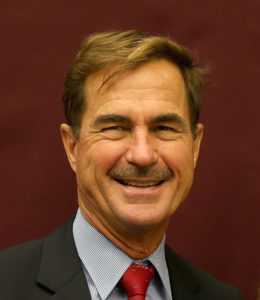Texas A&M’s Stelly recognized as ICAC Cotton Researcher of the Year
Writer: Kay Ledbetter, 806-677-5608, [email protected]
Contacts: Dr. David Baltensperger, 979-845-3041, [email protected]
Dr. David Stelly, 979-845-2745, [email protected]
COLLEGE STATION – Dr. David Stelly has been named the Cotton Researcher of the Year by the International Cotton Advisory Committee, known as ICAC.

Since being formed in 1938, ICAC’s global role has been to raise awareness of emerging issues, provide information relevant to the solving of problems and to foster cooperation in the achievement of common objectives.
Stelly’s research is leading to advances in multiple scientific and applied disciplines of cotton, the ICAC stated.
Stelly, a professor of cytogenetics, genetics, genomics and plant breeding in the soil and crop sciences department, holds a joint appointment with Texas A&M AgriLife Research and Texas A&M University in College Station.
“Dr. Stelly has made great strides in the world of cotton over the years and we are proud to have him on our faculty and research team,” said Dr. David Baltensperger, head of Texas A&M’s soil and crop sciences department.
Stelly has more than 40 years of diverse breeding experiences with diploid and polyploid crops, including researching germplasm introgression, reproductive biology and cytology, cytogenetics, genetics and genomics.
For over 30 years with Texas A&M, he has led a multi-faceted research program that collectively focuses on increasing the ability to use wild genetic resources for genetic improvement of cotton.
“Dr. Stelly’s research goal has been to enhance cotton’s productivity, quality and sustainability through genetic diversification, including the development of collaborations, germplasm, scientific knowledge, methods and resources to facilitate use of the newly introduced germplasm,” Dr. Sukumar Saha, 2011 recipient of the award and a U.S. Department of Agriculture-Agricultural Research Service geneticist at Mississippi State University, said in his nomination.
“Dr. Stelly is known internationally for his research efforts that integrate the fields of plant breeding, diploid and polyploid cotton cytogenetics, genetics, mapping, diversity analysis, evolution, wide-cross germplasm introgression, reproductive biology, cytology, cytogenomics and bioinformatics,”
Stelly earned his bachelor’s degree in genetics from the University of Wisconsin, his master’s degree in plant breeding and cytogenetics from Iowa State University and his doctorate in plant breeding and plant genetics at University of Wisconsin.
He joined Texas A&M in 1983 and many of his accomplishments in research, teaching and service have brought and are still bringing benefits to global cotton improvement efforts, especially as related to genetic diversification, manipulation and improvement, Saha said in the nomination.
ICAC, in recognizing Stelly, said, “Dr. Stelly has revolutionized global cotton research capabilities by enabling global use of single nucleotide polymorphisms for large-scale and targeted small-scale applications. He spearheaded formation of the international Cotton SNP Chip Consortium and development of the CottonSNP63K Array, which enables high quality, high-density SNP genotyping of Upland cottons.
Stelly’s genetic work has featured extensive efforts to create and analyze chromosome substitution lines. By replacing entire chromosomes of cotton with genes from a related species, he established means to more effectively harness the non-cultivated species germplasm resources for genetic analysis and the breeding of improved upland cotton.
He is chair of the International Cotton Genome Initiative, past president of the National Association of Plant Breeders, external reviewer of the USDA’s Plant Genetic Resources, Genomics and Genetic Improvement program, member of the International Organizing Committee for WCRC-6, and the National Academy of Sciences GE Crops Committee.
He has twice received the Cotton Genetic Research Award. Recently, he became a Fellow of the Crop Science Society of America., and received the Lifetime Achievement Award at the National Conference on Genetics and Cytogenetics at the University of Agricultural Sciences, Dharwad, India.


